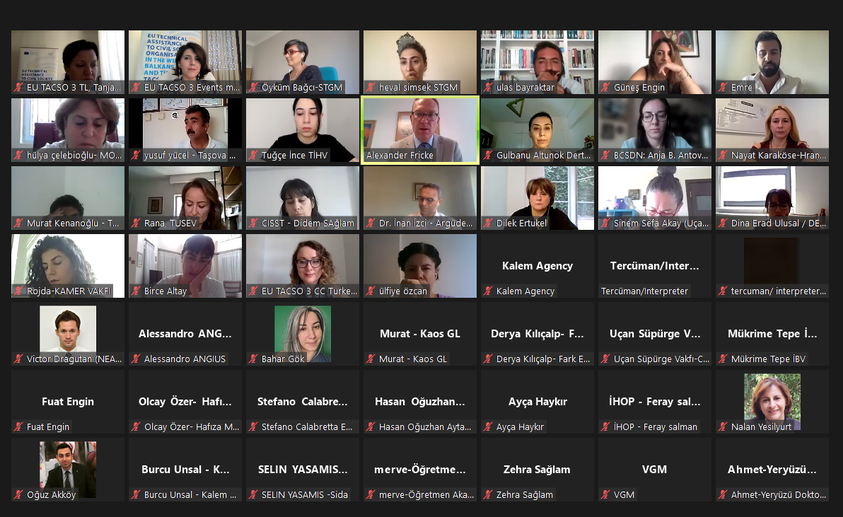
On 1 September 2021, the EU TACSO 3 organized a consultation and validation meeting on the Assessment of the EU Civil Society Guidelines implementation for the period of 2020 in Turkey. In the introduction, Alexander Fricke, EU Delegation to Turkey, Head of Section Civil Society, Fundamental Rights, Judiciary and Home Affairs, emphasized that this consultation is replicated in all the enlargement countries and underlines generally the importance given to a strong and vivid civil society and the dialogue among EU and civil society in the context of EU accession process. He underlines that EU CS Guidelines is comprised of a political statement clarifying the aims of the EU support and also include set of indicators to practically measure the results for each of the set objectives in EU CS Guidelines. He took attention to the fact that throughout the whole IPA II period EU CS Guidelines have been a very useful instrument to jointly monitor the changes of the legal environment for CSOs and the capacities of CSOs and their activities. Now, the previous version of the EU CS Guidelines was revised to identify more relevant and detailed indicators and also represents EU’s increasing focus on results-based approach for financial cooperation.
Tanja Hafner Ademi, EU TACSO 3 Team Leader and Ulaş BayraktarBalkan Civil Society Development Network Researcher, presented regional context and national assessment findings for Turkey reflecting on the conducive environment for civil society, the mechanisms for cooperation between CSOs and public institutions and CSOs capacities. In general, the situation in Turkey did not changed significantly compared with the 2019 assessment. Although the basic freedoms is secured within the constitutional framework and in line with international standards, the use of this freedoms has become increasingly problematic due to the two major recent legal changes including the disclosure of members’ information and the Law on Preventing Financing of Proliferation of Weapons of Mass Destruction. In terms of the tax regulations CSOs still are treated as for-profit businesses and the government support for CSOs still remains very limited and non-transparent. The inclusion of CSOs into the decision-making mechanisms remains weak due to traditional centralized political system, especially with presidential transition and many laws have passed without consultation with CSOs, such as the retreat from the Istanbul Convention. While the CSOs capacities need to be further strengthened especially in relation to internal M&E systems on organizational level, CSOs face with significant financial constraints and lack of adequate human resources.
During the debate moderated by EU TACSO 3 Country Coordinator, Özge Konuralp, the participant CSOs took attention to the increasing authoritarianism and censorship in Turkey. On the other hand, although there is a shrinking legal and financial environment for CSOs in Turkey, particularly during the COVID-19 pandemic, there is also a strong resilience of CSOs who really worked hard to overcome the difficulties derived from the pandemic. CSOs took attention to the hidden aspect of censorship done by funding organisations who follow the same conservative approach towards rights-based organisations. Participant CSOs underlines the negative effects of two major recent legal changes on disclosure of members’ information of CSOs and financing of terrorism which resulted with permanent audits and loss of CSO members. In addition to that the existing trend of not participating into the researches and refraining from participating into to CSO networks in order not to be labelled by the public authorities were also highlighted by the participant CSOs. More than 50 participants representing CSOs, public institutions and international organizations participated in the event and provided their perceptions and opinions that will be compiled and further integrated in the final EUCSG Assessment Report for 2020.
